By Eric Vandenbroeck and co-workers
How
Institutional Balancing Promotes Stability In Asia
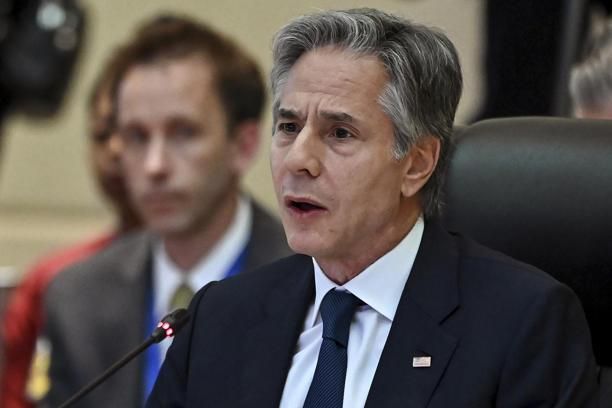
U.S. Secretary of State Antony Blinken told Southeast
Asian leaders Friday that the U.S. is concerned about China's “increasingly
dangerous and unlawful” activities in the disputed South China Sea during an
annual summit meeting, and pledged the U.S. will continue to uphold freedom of
navigation in the vital sea trade route.
Philippine President Ferdinand Marcos Jr. listens
during the 12th Association of Southeast Asian Nations (ASEAN) -U.S. Summit in
Vientiane, Laos.
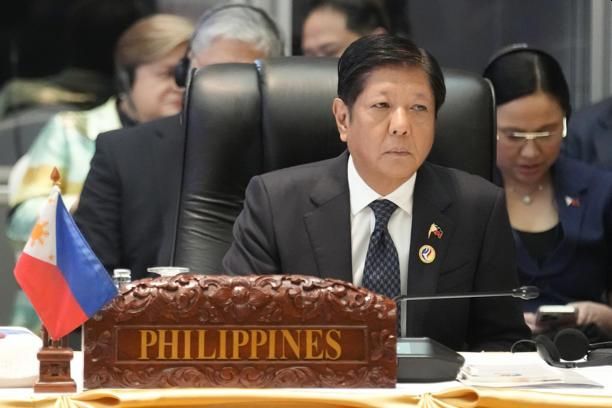
The 10-member Association of Southeast Asian Nations
meeting with Blinken followed a series of violent confrontations at sea between
China and ASEAN members Philippines and Vietnam, which have fueled concerns
that China’s increasingly assertive actions in the waterways could spiral into
a full-scale conflict.
China, which claims almost the entire sea, has
overlapping claims with ASEAN members Vietnam, the Philippines, Malaysia, and
Brunei, as well as Taiwan. About a third of global trade transits through the
sea, which is also rich in fishing stocks, gas, and oil.
Beijing has refused to
recognize a 2016
international arbitration ruling by a U.N.-affiliated court in the Hague that
invalidated its expansive claims and has built up and militarized islands it
controls.
South Korean
President Yoon Suk-yeol, center, arrives ahead of the 19th East Asia Summit in
Vientiane, Laos, Friday, Oct. 11, 2024.
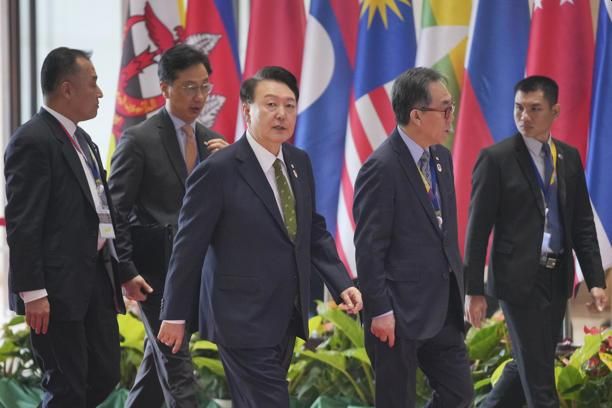
China, which claims almost the entire sea, has
overlapping claims with ASEAN members Vietnam, the Philippines, Malaysia, and
Brunei, as well as Taiwan. About a third of global trade transits through the
sea, which is also rich in fishing stocks, gas, and oil.
Beijing has refused to
recognize a 2016
international arbitration ruling by a U.N.-affiliated court in the Hague that
invalidated its expansive claims and has built up and militarized islands it
controls.
“We are very concerned about China’s increasingly
dangerous and unlawful activities in the South China Sea which have injured
people, harm vessels from ASEAN nations and contradict commitments to peaceful
resolutions of disputes,” said Blinken, who is filling in for President Joe
Biden, in his opening speech at the U.S.-ASEAN summit. “The United States will
continue to support freedom of navigation, and freedom of overflight in the
Indo Pacific.”
The U.S. has no claims in the South China Sea, but has
deployed navy ships and fighter jets to patrol the waters in a challenge to
China’s claims.
Chinese and Philippine vessels have clashed
repeatedly this year, and
Vietnam said last week that Chinese forces
assaulted its fishermen in
the disputed sea. China has also sent patrol vessels to areas that Indonesia
and Malaysia claim as exclusive economic zones.
The U.S. has warned repeatedly that it’s obligated to
defend the Philippines —
its oldest treaty ally in Asia — if Filipino forces, ships or aircraft come
under armed attack, including in the South China Sea.
Philippine President Ferdinand Marcos Jr. complained
to summit leaders on Thursday that his country “continues to be subject to
harassment and intimidation” by China. He said it was “regrettable that the
overall situation in the South China Sea remains tense and unchanged” due to
China’s actions, which he said violated international law. He has called for
more urgency in ASEAN-China negotiations on a code of conduct to govern the
South China Sea.
Singaporean leader
Lawrence Wong earlier this week warned of "real risks of an accident
spiraling into conflict” if the sea dispute isn't addressed.
Malaysia, who takes over the rotating ASEAN chair next
year, is expected to push to accelerate talks on the code of conduct. Officials
have agreed to try and complete the code by 2026, but talks have been hampered
by sticky issues including disagreements over whether the pact should be
binding.
U.S. Secretary of State Antony Blinken attends the
12th ASEAN-U.S. Summit in Vientiane Friday, Oct. 11, 2024.
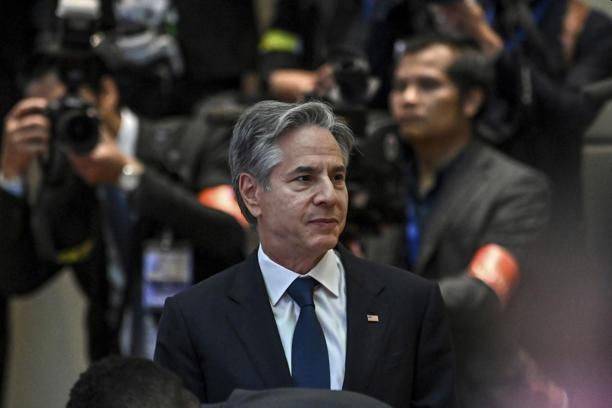
Chinese Premier Li Qiang was defiant during talks on
Thursday. He called South China Sea a “shared home” but repeated China’s
assertion that it was merely protecting its sovereign rights, officials said.
Li also blamed meddling by “external forces” who sought to “introduce bloc
confrontation and geopolitical conflicts into Asia.” Li didn’t name the foreign
forces, but China has previously warned the U.S. not to meddle in the region’s
territorial disputes.
U.S. Secretary of State Antony Blinken, second from
right, is greeted by Cambodian Prime Minister Hun Manet during the 12th
Association of Southeast Asian Nations (ASEAN)
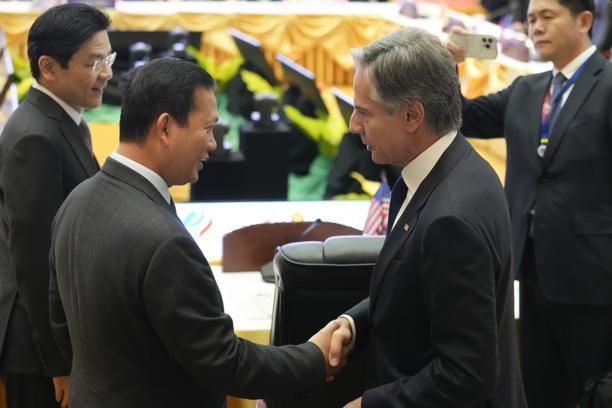
In another firm message to China, Blinken said the
U.S. believed “it is also important to maintain our shared commitment to
protect stability across the Taiwan Strait.” China claims the self-ruled island
of Taiwan as its own territory and bristles at other countries’ patrolling the
body of water separating it from the island.
Blinken also attended
an 18-nation East Asia Summit, along with the Chinese premier, Russian Foreign
Minister Sergei Lavrov, and leaders from Japan, South Korea, India, Australia
and New Zealand.
ASEAN has treaded carefully on the sea dispute with
China, which is the bloc's largest trading partner and its third largest
investor. It hasn't marred trade relations, with the two sides focusing on
expanding a free trade area covering a market of 2 billion people.
Blinken said the annual ASEAN summit talks were a
platform to address other shared challenges including the civil war in Myanmar,
North Korea’s “destabilizing behavior” and Russia’s war aggression in Ukraine.
He said the U.S. remained the top foreign investor in the region, and aims to
strengthen its partnership with ASEAN.
Laos' Prime Minister Sonexay
Siphandone and his wife Vandara
Siphandone wait to welcome guests for the gala
dinner, during the Southeast Asian Nations (ASEAN) Summit in Vientiane, Laos,
Thursday, Oct. 10, 2024.
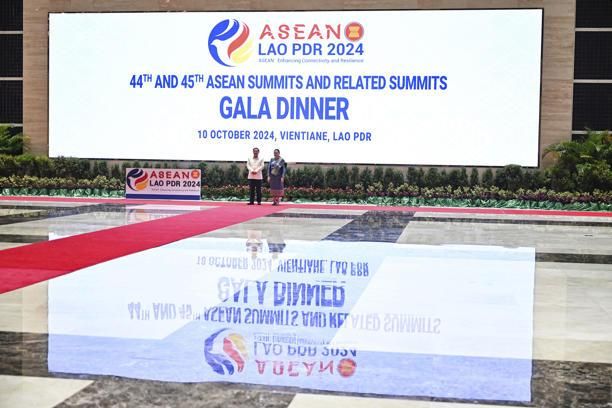
U.S. Secretary of State Antony Blinken, center,
arrives during the 12th Association of Southeast Asian Nations (ASEAN) -U.S.
Summit in Vientiane, Laos, Friday, Oct. 11, 2024.
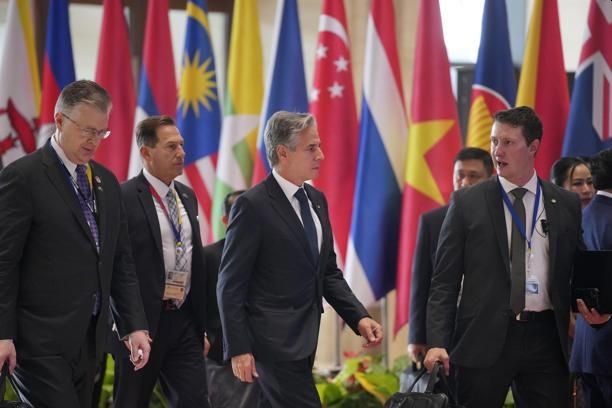
Japanese Prime Minister Shigeru Ishiba
waits before the start of the 19th East Asia Summit in Vientiane, Laos, Friday,
Oct. 11, 2024
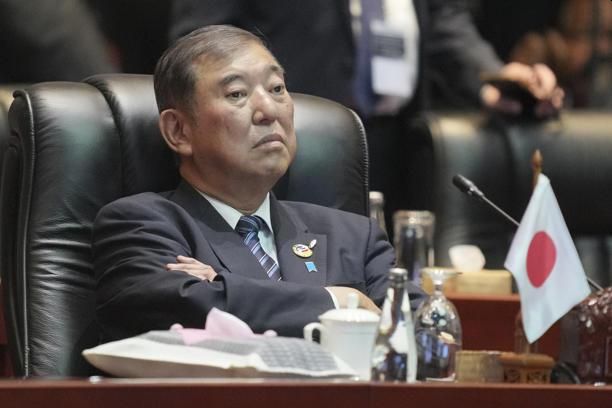
Chinese Premier Li Qiang, left seated, listens beside
Japanese Prime Minister Shigeru Ishiba, right seated,
during the 19th East Asia Summit in Vientiane, Laos, Friday, Oct. 11, 2024.
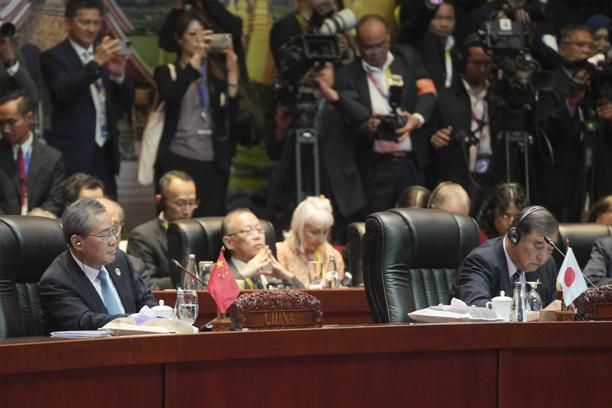
Russian Foreign Minister Sergey Lavrov, left, shakes
hands with Thailand's Prime Minister Paetongtarn Shinawatra during the 19th
East Asia Summit in Vientiane, Laos, Friday, Oct. 11, 2024.
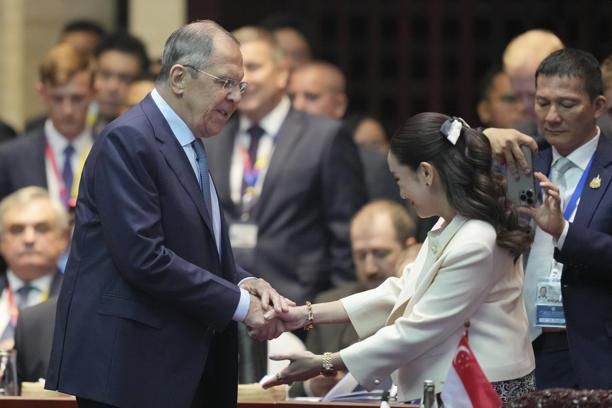
U.S. Secretary of
State Antony Blinken, left, shakes hands with Indian Prime Minister Narendra
Modi during the 19th East Asia Summit in Vientiane, Laos, Friday, Oct. 11,
2024.
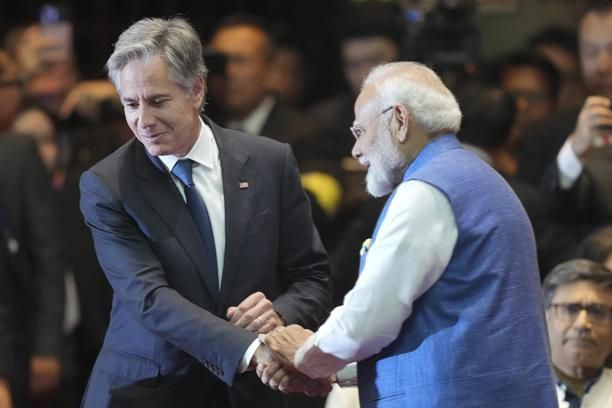
For updates click hompage here